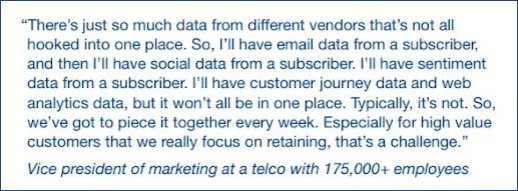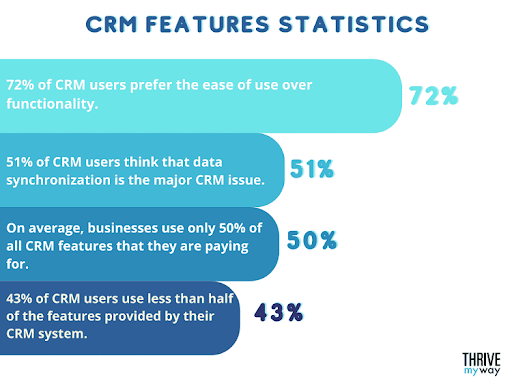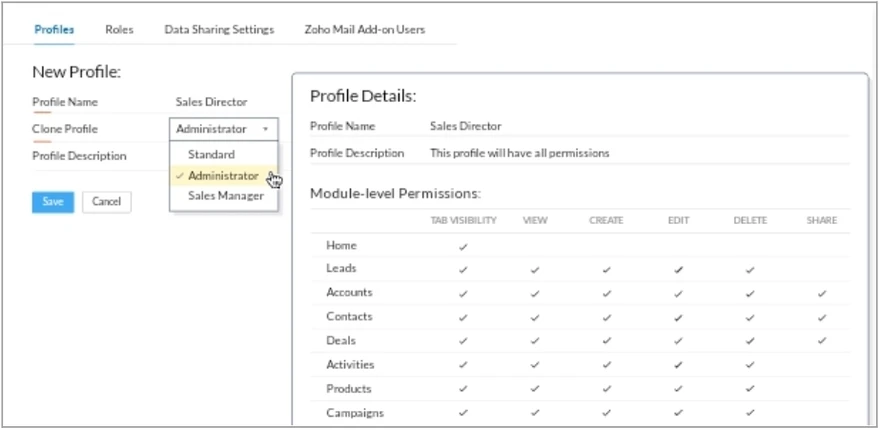8 Tips for Selecting the Right CRM Platform for Your Business
Published by Incomedia in Guides and Tips · Tuesday 09 Apr 2024
Choosing the wrong Customer Relationship Management (CRM) platform can put your business in a difficult situation.



Martin Gessner is the Founder of Focus on Force. He has spent over 10 years working in various Salesforce roles including business analyst, project manager, consultant, and solutions architect. Through his acclaimed book "The Salesforce Career Playbook", in-depth workshops, and personalized coaching programs, Martin has helped Salesforce professionals land dream jobs, earn top certifications, and unlock their full potential.
You're faced with either sticking to the current platform and bearing its inconveniences, or changing to a new one and reinvesting in customization, integration, and employee retraining. Then there’s the risk of inaccurate data migration, losing historical data, and operation downtime while transitioning.
But you can sidestep this situation. Want to know how to choose a CRM system for your business? Follow the eight tips discussed in this article:
1. Plan Your Budget
The first and most crucial tip is to sort your budget. Other tips will remain on your wish-list if you can't afford to buy CRM software. Besides, you want to avoid spending more money than you should. When you determine your budget from the get-go, you’ll know which CRM software solutions you can consider and discard right from the start.
To determine the right budget, first, consider your problems and goals. For example, do you struggle with inefficient lead management, poor customer communication, or a disorganized sales process? Identifying these issues helps you create a budget for a tool with the right CRM features that addresses your needs.
When planning your budget, consider the costs associated with setting up the CRM as well. Apart from setup fees, see how much you’d have to spend for licensing, customization, training, and integration. These costs can vary based on the complexity of your business requirements, the number of users, and the pricing tiers of various tools.
Look at the costs you’d also have to incur once the tool is set up. These typically include recurrent subscription charges, add-ons, data migration, maintenance, support, and additional system scaling costs.
When you follow this approach, you can establish a realistic and transparent budget for the right CRM software. This facilitates executive buy-in when seeking approval for investment.
2. Decide on CRM Deployment: Cloud vs. On-premise
Knowing how to choose a CRM system also means knowing the type of CRM deployment you want.
CRM deployment refers to the process of hosting and implementing CRM software. This can either be in the cloud or on-premise.
Cloud hosting uses the Software-as-a-Service (SaaS) model—a third-party cloud service provider hosts and maintains the CRM software. It offers scalability, flexibility, accessibility, and reduced IT overhead, making it an attractive option for organizations of all sizes and industries.
However, it comes with concerns such as dependency on internet connectivity, data security, privacy issues, and potential vendor lock-in.
On-premise hosting, on the other hand, involves setting up and maintaining servers, networking equipment, and other hardware within the organization's data cente or server room. It gives full control over the infrastructure and customization options. However, it requires significant upfront investment, ongoing maintenance, and expertise.
Differences between Cloud and On-Premise CRM Deployment
- Location
Cloud Deployment: Hosted on third-party servers
On-Premise Deployment: Hosted locally within the organization's servers - Upfront costsCloud Deployment: Lower upfront costOn-Premise Deployment: Higher upfront cost
- ScalabilityCloud Deployment: Scalable, often pay-as-you-go modelOn-Premise Deployment: Hardware may limit scalability
- MaintenanceCloud Deployment: Managed by the providerOn-Premise Deployment: Requires in-house IT staff for maintenance
- AccessibilityCloud Deployment: Accessible from anywhere with internet connectionOn-Premise Deployment: Accessible only within the organization's network
- FlexibilityCloud Deployment: Typically offers integrations with other cloud servicesOn-Premise Deployment: Integration requires more effort and resources
- IntegrationCloud Deployment: Hosted on third-party serversOn-Premise Deployment: Hosted locally within the organization's servers
- SecurityCloud Deployment: Hosted on third-party serversOn-Premise Deployment: Hosted locally within the organization's servers
- LocationCloud Deployment: Service provider handles security measuresOn-Premise Deployment: Organization has direct control over security measures
The decision to opt for either on-premise or cloud-based CRM solutions depends on your budget, customization needs, and security concerns. However, you might want to know that 80 percent of all CRM sales in 2020 are cloud solutions compared to 88 percent on-premise in 2015.
This is likely because many CRM tools offer custom advanced features through enterprise plans, limiting the need for on-premise solutions.
3. Identify Must-Have Features of Ideal CRM
The must-have features of CRM tools are those necessary to manage customer relationships and streamline sales processes. Other extra features are nice-to-have, but if required, a nice-to-have feature can also be a must-have.
Identifying and outlining these features is crucial to narrow down your options. Some must-have CRM features to consider are:
Contact Management: This provides a centralized database for storing and managing customer information, including contact details, interactions, and preferences.
Activity Tracking: This records interactions and allows for synchronized communication between team members and the customer through phone calls, emails, meetings, tasks, social media interactions, notes, and documents.
Email-Client Integration: This feature is important because emails are a primary communication channel in business settings. An email-client integration ensures your CRM captures a substantial portion of customer interactions. That way, you can send automated personalized emails and good newsletters to leads and prospects at different stages of their sales cycle based on predefined conditions.
Reporting and Analytics: This provides insights into your business's performance, customer behaviour, and trends to enable you make data-driven divisions, forecast sales, and track the performance of your team. Without this feature, your company will operate blindly.
Lead Management: This feature is important because it directly impacts revenue generation. It helps automate lead assignments for timely follow-up to nurture them through the sales pipeline efficiently, increasing the likelihood of conversion.
Task Automation: This feature is a must-have because it promotes sales team efficiency by automating mundane and repetitive tasks such as data entry, lead profile update and follow-up reminder.
The nice-to-have CRM features include:
Social Media Integration: While it can provide valuable insights into customer behaviour and interactions, not all businesses rely on social media for customer relationships.
Document Management: Although it improves the accessibility and organization of documents, business organizations with existing document management systems may find this feature redundant within their CRM.
Predictive Analytics: This feature can help businesses anticipate customer needs and trends, but implementing and maintaining predictive models can be resource-intensive. Hence, basic reporting and analytics may suffice for some companies.
Other nice-to-have features include customizations, add-ons, task management, postcard automation, SMS, invoicing, custom fields and tags, multi-language and multi-currency support.
Remember that whether or not these features remain nice to have depends on your preferences.
4. Check Integration With Other Applications
This research by Forrester revealed 41 percent of businesses face challenges with multiple siloed customer data. It captured the experience of the vice president of marketing at a Telco:

The above quote shows how fragmented data can be burdensome and almost useless for businesses. This problem often arises due to inadequate integration between business software applications.
But, when you use a CRM that provides multiple seamless integrations, you gain a more comprehensive view of your customers' interactions, enable data sharing between departments, and optimize your decision-making processes.
Want to know how to choose a CRM system that’s right for you? Ensure it offers pre-built integrations with popular business tools such as:
- Email Marketing Tools for seamless synchronization of customer data and targeted email campaigns.
- Marketing Automation Tools to enable automated lead nurturing, personalized messaging, and tracking of marketing campaigns' effectiveness.
- Customer Support Systems to give a holistic view of customer interactions, enabling better support and issue resolution.
- Calendar Integration for efficient scheduling and management of appointments with customers.
These pre-built integrations are often easy to set up and require minimal technical expertise.
For business apps your CRM doesn't natively integrate with, use third-party integration platforms like Zapier, Integrately, and Boomi. They connect different apps and automate business workflows.
5. Look at GDPR Compliance
GDPR or General Data Protection Regulation is a European Union (EU) rule that grants individuals control over the processing of their data. It mandates businesses to obtain consent for data usage, ensure data security, and notify individuals of any issues.
This regulation applies to European companies and any entity collecting and processing EU residents' data. Non-compliance can lead to significant fines and penalties.
To comply, choose a CRM system that assists in GDPR compliance. Here's how CRMs help:
Consent Management: They manage customer consent details and allow businesses to easily retrieve and verify them when needed.
Data Governance: They centralize customer data and provide tools for controlling access to ensure only authorized persons can access and process the data.
Data Subject Rights: They enable you to practice data subject rights like prompt accessing and rectification of personal data based on the subject's requests.
Data Security: They offer robust security features to protect customer data from unauthorized access and theft. We’ll talk more about data security later.
Data Breach Notification: They aid in timely notification of authorities and affected individuals in case of a data breach.
Some GDPR-compliant CRM software includes Salesforce, Zoho, Pipedrive, and Zendesk.
6. Consider User-Friendliness
Difficult-to-use CRMs can slow down adoption rates among teams. According to a Salesforce report, 75 percent of CRM users prefer an easy-to-use CRM over complex functions.

Source: Deal Code
To increase your chances of making sales and enhancing smooth CRM adoption, choose a CRM system that's easy to use.
Go for a clean and intuitive user interface that's easy to navigate. Users should be able to add, edit, and manage their data easily.
Speaking of data, look for a CRM tool that also allows users to search and filter for relevant information, such as contacts, names, and addresses, quickly.
Imagine using a CRM with a vast customer database that requires you to search for information manually every time you need it. This tedious process is not only time-wasting but poses a risk of losing sales opportunities.
Finally, the CRM should have a mobile app so users can access and manage data on the go. A staggering 85% of workers also use their smartphones for work purposes. A mobile CRM app will enable users to perform important tasks even when they are away from the office.
7. Look at Data Security
Modern businesses thrive on data. Think about it.
Online stores need to collect and store their customers data to ensure they suggest the right products and to identify cross-selling and Up Selling opportunities. Meanwhile, software companies rely on customer data to run personalized SaaS marketing campaigns, detect users who are at the risk of churning and so on.
All that data is usually housed in CRM tools, making them prime targets for cyber attacks. Therefore, choosing a tool that guarantees data security to protect customer privacy and safeguard organizational assets is important. We’ve already seen how data security is also essential to regulatory compliance.
In this regard, data encryption is a primary feature to consider in a CRM system. You want the tool to be able to encode data during transmission and storage to prevent unauthorized access.
Your choice CRM tool should also have automated backup features and procedures to facilitate data recovery in case of system failures or breaches. The tool should also encrypt these backup copies.
Also, look for a CRM solution that offers role-based access control features. These will help ensure users only access data relevant to their responsibilities. CRM tools with such features help mitigate internal risks caused by rogue employees or compromised accounts.

Source: Zoho
Zoho is one example of a CRM solution that offers such features. With the tool, you can create roles for each team member based on their position in your organization’s hierarchy. There’s also a Share Data with Peers option for employees who need access to specific information but can’t see it because of their default CRM role.
8. Check for Customization and Training
There's no one-size-fits-all CRM system. To drive better outcomes, you need customization features to align your chosen CRM with your business needs. Knowing how to choose a CRM system that’s specific to your business requires ensuring the tool has key customization capabilities such as:
- Flexibility to automate workflows, processes, and notifications to streamline operations and improve efficiency.
- Ability to create custom reports, analytics, and dashboards tailored to specific business metrics.
- Options to brand the CRM interface with company logos, colours, and other branding elements for a custom experience.
Also, consider your CRM platform's training needs to enable you to fully leverage its capabilities. Ensure the service provider offers training resources and personalized demo sessions to facilitate smooth adoption.
Customization levels and training support can vary based on the pricing structure of different tools. So, compare pricing plans to ensure you get the best deal at the best price.
Conclusion
Customers are the lifeblood of any business, and how you manage them determines your business's survival. This demands thoroughness in your CRM software selection process. You need to know how to choose a CRM system.
By following the tips mentioned, you'll be able to choose the best one within your budget. You can customize it to your business needs, ensure swift adoption, and establish a secured data repository. Ultimately, you can cultivate customer relationships that enhance satisfaction, retention, and loyalty.
Martin Gessner is the Founder of Focus on Force. He has spent over 10 years working in various Salesforce roles including business analyst, project manager, consultant, and solutions architect. Through his acclaimed book "The Salesforce Career Playbook", in-depth workshops, and personalized coaching programs, Martin has helped Salesforce professionals land dream jobs, earn top certifications, and unlock their full potential.

